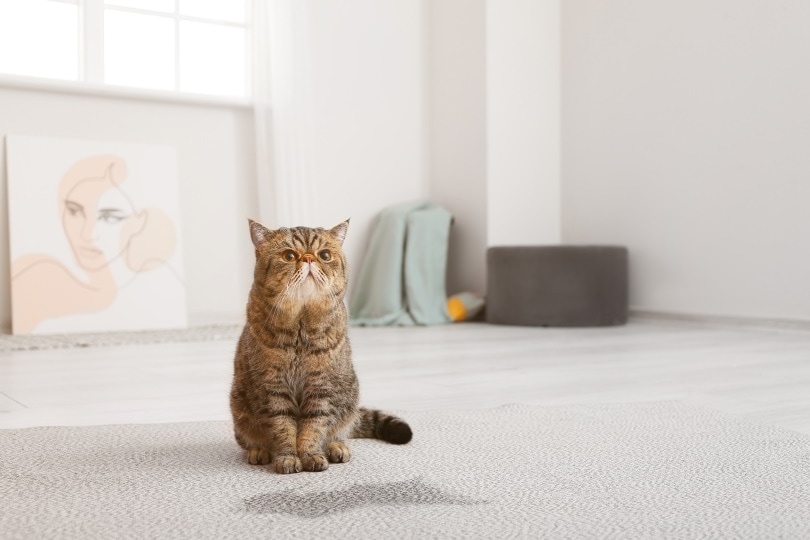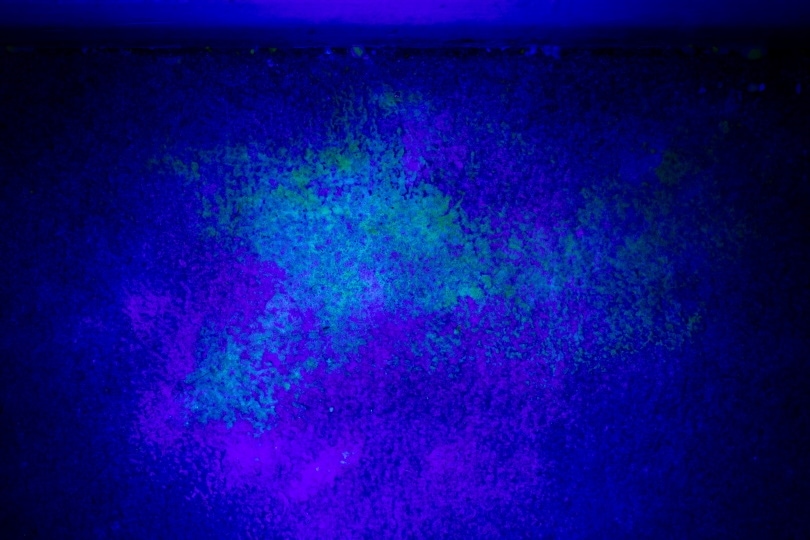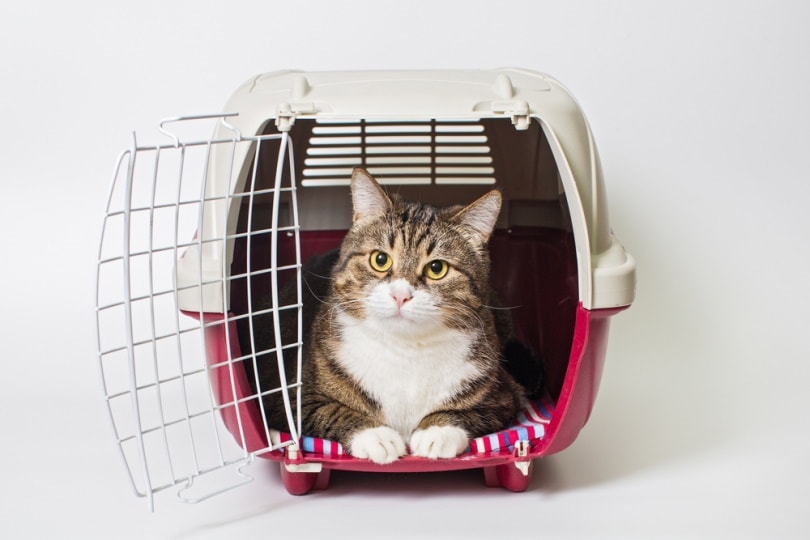How to Find Cat Urine Without a Blacklight – 4 Easy Methods

Updated on

Anyone who has ever had a cat go potty outside of the litter box in the house knows the struggle. Trying to get the harsh ammonia smell of cat pee out of fabrics, furniture, and carpets can be a real pain. Sometimes, it can be challenging to find it in the first place.
So, if you’re having trouble finding a spot you can smell but can’t see, a blacklight isn’t the only way. Let’s discuss different methods to help you out.
The 4 Ways to Look for Cat Urine Without a Blacklight
1. Check Specific Spots
Even when we can’t smell the left-behind enzymes and pheromones, our cats sure can. Long after you’ve cleaned, washed, or sanitized a surface, cats (whose sense of smell is 14 times better than humans) can smell these dried-out memories, creating a chain reaction.
Cats are repeat offenders—let’s face it. If this has happened before, your best bet is to check a previously saturated location. Even if it’s not on the exact spot, it can be nearby.
2. Clean, Clean, Clean
Strip your beds, take down your curtains, and remove the couch cover. Take everything nearby and give it a good washing wherever the pee is. If you wash these items in the washing machine, use an enzyme remover in addition to the wash. It will remove those trace components you can’t see or smell to reduce the chance of this happening again. Some pet companies offer products to reduce and eliminate this problem in sprays, concentrated cleaners, powders, and laundry detergents.
Our favorite enzyme cleaner is the Hepper Advanced Bio-Enzyme Pet Stain & Odor Eliminator Spray. It's our product, and we love it so much, we just have to share. It permanently removes the very worst smells and stains (yes, everything you can imagine!), and we offer a 100% satisfaction guarantee!
- ADVANCED ENZYMATIC CLEANER - Penetrates the most stubborn smells and stains at the deepest molecular...
- FOR ANY MESS, ON ANY SURFACE - This pet odor eliminator cleans your carpets, floors, furniture,...
3. Smell Around
You might have to get down on your hands and knees for this one. Sometimes you can’t beat the old sniffer. If your olfactory system doesn’t cut the mustard, we are sure your dog can find it. Send Fido on the search. We’re sure a canine friend will gladly tell on his kitty roommates.
The upside here is that cat urine is an extremely easy-to-pinpoint scent. Even though you might have to get into the nooks and crannies to find the offense, it should be easy to detect long after it has dried once you’re right upon it.
4. Sprinkle Baking Soda

If you have a carpeted space or other fabric that’s difficult to see wet, sprinkle baking soda over the affected area. The baking soda will dissolve quickly with liquid contact.
Even if the floor is dry when you find the spot, baking soda is terrific at neutralizing the smell, sanitizing the fabric, and removing stains.
Typically, you should mix baking soda with a touch of water until it makes a paste. You can apply this over the urine spot. Once the baking soda dries completely, you simply sweep it up, verify that the smell and stain are gone, and go about your day.
What Causes Cats to Go Outside of the Litter Box?
The reason for the accident says a lot about your cat is using the home as a litter box. For instance, a kitten might have an accident, whereas an adult might feel very stressed or hormonal. Let’s explore in more detail.
Marking
If you have a male or female intact after sexual maturity, spraying is very common. Cat mark with spray to claim territory and attract mates.
Hormones
Females spray to distribute their pheromones to potential suitors. When they are in heat, they might pee or spray.
Dirty Litter Box
Hygiene is important to cats. Having a dirty litter box might make them take another course of action. It’s crucial to sift through the litter box every day to keep it tidy and fresh. This will keep your house smelling fabulous and make your kitty happy.
Territorial Behavior
Some cats don’t like to share. If you have a multi-cat home, one of them might be protesting the communal use of space. The general rule of thumb is to have one litter box per cat, plus one more.
Benefits of Buying a Blacklight

Even though you can use methods to scout out urine spots, nothing is quite as accurate as a blacklight. Using ultraviolet light, you can visibly see the stains, so you know exactly where to clean them.
If you don’t get the trace amounts that you can’t detect but your cat can, they will likely use the area for a litter box again if the need arises. Black lights provide a path to a solution.
Are Blacklights Expensive?
Blacklights can be cheap or pricey, depending on the brand, features, and quality. If you have a cat with a urine problem, it could honestly save you a lot of money in the long run that you will spend on cleaning products that might not even work.
You can buy efficient, price-friendly blacklights for reasonable prices so you can uncover the problem once and for all.
Final Thoughts
If you are in an emergency situation and you need to find a pee spot fast, use the methods we mentioned. Sure, they aren’t surefire ways to find the pee, but they’re definitely helpful.
If you’re going through a situation with your cat where you might need a little extra help due to repeat offenses, maybe it’s best to invest in a black light. They’re usually inexpensive and work as intended.
See also:
- How Long Does Cat Urine Smell Last? What You Need To Know!
- 10 Best Cat Litters for Multiple Cats – Reviews & Top Picks
Featured Image Credit: Pixel-Shot, Shutterstock













